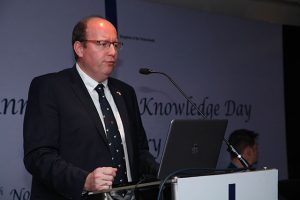The Netherlands brings “Dutch Knowledge Day” to Hyderabad and focused on the important topic ‘Bird Welfare’
Published on November 26, 2019
Hyderabad: On the occasion of 13th Poultry India meet being held in Hyderabad, the Netherlands Business Support Office (NBSO), Hyderabad hosted the third edition of the “Dutch Knowledge Day”.
 The session was held at Novotel HICC on November 25, to share the expertise and experiences of Dutch Poultry Industry with business leaders and relevant stakeholders in the Indian poultry sector. This years’ edition focused on ‘Bird Welfare’ considering certain court cases which the Indian farmers fear, would render the poultry industry untenable.
The session was held at Novotel HICC on November 25, to share the expertise and experiences of Dutch Poultry Industry with business leaders and relevant stakeholders in the Indian poultry sector. This years’ edition focused on ‘Bird Welfare’ considering certain court cases which the Indian farmers fear, would render the poultry industry untenable.
While interacting with the business leaders, and other key stakeholders from the poultry industry in India, Prof. Bas Rodenburg of Utrecht University and Dr. Jasper Heerkens of Aeres Centre stressed on the benefits and need of cage-free housing for laying hens along with throwing light on ‘alternative cage systems’ available in the market.
“Bird welfare is interconnected to health, farmer’s wellbeing and income. So, working towards bird welfare will bring a holistic change in the entire system.” shares Prof. Bas Rodenburg of Utrecht University.
Talking about it how focus on animal welfare will eventually help productivity, he adds, “Cage-free housing helps them the freedom to move around and gives room to their natural behavior and this keeps them happy which in turn leads to higher production. Along with that, there are more chances of injuries as they are independent, which in cages can be avoided but with quality management towards providing safety, the injuries can be avoided.”
Continuing the management part and how it has been practiced in the Netherlands, Dr Jasper Heerkens of Aeres  Centre shares, “In Netherlands, cage-free housing has been a learning process since 20-30 years. The farmers should accept that the first flock will not be the best performing flock. They have to accept that in the beginning production may be a bit low and mortality will be a bit higher. The farmers should understand that there is no requirement to start from the scratch in India, as many countries around the world already have their experiences on the transition and are willing to share this experience of cage-free housing for the good results. It includes breeder companies, housing equipment companies, lighting companies who all have an interest in the farmer doing well.”
Centre shares, “In Netherlands, cage-free housing has been a learning process since 20-30 years. The farmers should accept that the first flock will not be the best performing flock. They have to accept that in the beginning production may be a bit low and mortality will be a bit higher. The farmers should understand that there is no requirement to start from the scratch in India, as many countries around the world already have their experiences on the transition and are willing to share this experience of cage-free housing for the good results. It includes breeder companies, housing equipment companies, lighting companies who all have an interest in the farmer doing well.”
They have also shared that though cage-free housing has been practised in the Netherlands since years and giving great results, the biggest difference between India and Netherlands is climatic condition but there are many companies who have the expertise in implementing cage-free housing systems in climatic conditions similar to that of India. They have also highlighted that people now are getting more conscious about animal welfare and about their own health, and therefore, will increasingly clamour for switch to models involving more bird welfare. They say that this should be a collaborative effort between companies and farmers keeping the economical conditions and demands of the country in mind. Bird welfare will not only provide a better environment and healthy life to birds but also the people who are consuming it will also be benefitted. If they consume something healthy, they will be healthy too.
They also spoke about how poultry welfare not only focuses on the animal aspects of welfare (e.g. feather pecking, footpad lesions, beak treatment, tail biting) but also on its societal importance.
The Dutch experts were able to share their experiences in the Netherlands favorably, which could help the Indian farmers to gain from their experience. The animal welfare will take center-stage in India in the years to come, with Government and the society becoming increasingly conscious of welfare of animals.























